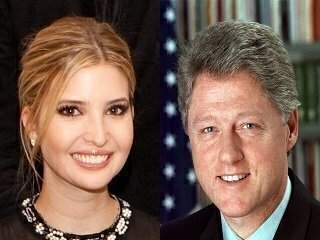Recently, the Washington Post listed 36 possible Donald Trump running mates, including his daughter, Ivanka. And there has been a debate since 2008 about Bill Clinton as a VP candidate. Does the Constitution allow these scenarios?
 On the Ivanka candidacy as part of a possible dad-daughter ticket, the 34-year-old business woman could cost Donald Trump some electoral votes if she doesn’t move out of Manhattan. But she would appear to have few constitutional barriers to running as a part of a Trump-Trump ticket. In the case of former President Bill Clinton, he has two constitutional amendments as very large barriers blocking a Clinton-Clinton ticket.
On the Ivanka candidacy as part of a possible dad-daughter ticket, the 34-year-old business woman could cost Donald Trump some electoral votes if she doesn’t move out of Manhattan. But she would appear to have few constitutional barriers to running as a part of a Trump-Trump ticket. In the case of former President Bill Clinton, he has two constitutional amendments as very large barriers blocking a Clinton-Clinton ticket.
To be sure, there seems to be little interest, at least publicly, in these proposed family presidential tickets from the potential VP candidates themselves, but the mere possibility of discussing them can shed some light on the murky concept of who can run for and is eligible to be Vice President.
In theory, anyone elected or named as Vice President needs to be eligible to hold the office of President, if the President is unable to serve in the office due to death, disability or resignation.
The Constitution originally stated three qualifications for someone to serve as President: The President must be at least 35 years of age, be a natural born citizen, and must have lived in the United States for at least 14 years. The 12th Amendment, ratified in 1804, also said in its final sentence that "no person constitutionally ineligible to the office of President shall be eligible to that of Vice-President of the United States."
Later, the 22nd Amendment, ratified in 1951, set term limits on the presidency. “No person shall be elected to the office of the President more than twice, and no person who has held the office of President, or acted as President, for more than two years of a term to which some other person was elected President shall be elected to the office of President more than once.”
Ivanka Trump has a few interesting wrinkles in a prospective VP run. She was born on October 30, 1981 in New York City. Her father was also born New York City; her mother, Ivana, was born in the Czech Republic, and she became a naturalized American citizen in 1988, seven years after daughter Ivanka was born.
Ivanka Trump will be at least 35 years old before this 2016 presidential election. And unless there is a legal case that both parents of a candidate need to be American citizens at the time of a candidate’s birth, she doesn’t seem to face a citizenship issue.
But Donald Trump and Ivanka Trump live in the same state – does that make Ivanka ineligible to run as Vice President? Not quite. According to the Constitution’s Article II, "The electors shall meet in their respective states, and vote by ballot for two persons, of whom one at least shall not be an inhabitant of the same state with themselves."
So electors just in New York state could vote for Donald Trump or Ivanka Trump in the Electoral College, but not both. Dick Cheney solved that problem before the 2000 election by establishing residence in another state, which could be a very easy solution for the Trumps, with their real estate holdings.
As for Bill Clinton becoming the next Vice President, the 12th and 22nd Amendments are formidable barriers. The 22nd Amendment says no one can be elected as President more than twice and the 12th Amendment says the Vice President needs to be “constitutionally eligible” to be President.
Eugene Volokh from the UCLA School of Law looked at this scenario back in 2015, when academics started dissecting the meanings of the words “eligible” and “electable.” Volokh points to one theory from Bruce Peabody and Scott Gant that a former two-term President could serve as Vice President in some scenarios. For example, Congress could approve the nomination of a former President as Vice President under the 25th Amendment, which allows for a new Vice President to be named when that office is vacant.
Volokh also cited the authoritative work from Yale’s Akhil Amar on the same subject. “It would seem that a two-term incumbent is ‘ineligible’ to the presidency (within the meaning of the Twelfth Amendment) precisely because he is made unelectable to that office (by the Twenty-second) — and is thus barred (by the Twelfth) from being elected to the vice presidency in the first place,” argues Amar.
And of course, Hillary and Bill Clinton are also from the same state as the Trumps. Would Bill Clinton establish residence in a different state if he ran as Vice President?
For now, it seems highly unlikely that either Ivanka Trump or Bill Clinton will be a 2016 vice presidential nominee. And we'll know for sure by late July, when the parties meet at their conventions.







